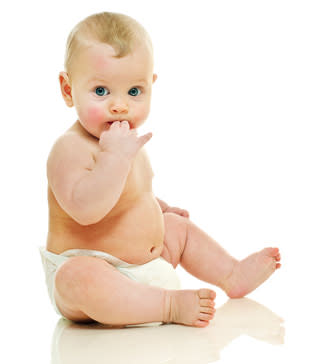 Yahoo Lifestyle
Yahoo LifestyleThe most common words babies mispronounce
Kids may say the funniest things, but what’s normal when it comes to speech development and how can you help them learn?

Ask any parent which words their babies and toddlers mispronounced and you’ll get a flood of phrases.
Bibbit (biscuit), spogito (mosquito), hossbibal (hospital); every family has its own lexicon of baby talk, treasured long after their kids have grown up.
Some are harmless, while others are embarrassing – one mum said she blushed every time her daughter failed to pronounce the ‘l’ in ‘clock’.
But why do toddlers find some words so tough, and how can parents help?
The kids’ speech
The survey by Calpol asked 700 parents which words their toddlers struggled with. It found that many children slipped up over on the same words: 70% said their youngsters had called ‘yellow’ ‘lello’, while almost one in five couldn’t manage ‘spaghetti’.
Even everyday words like ‘water’ were a common stumbling block, with lots of tots saying ‘morta’ instead.
What they hear and what they say
It’s not just that babies have to learn words; some sounds are trickier for growing mouths to master.
Sophie Jankel, a London-based speech and language therapist, explained: “Babies are usually able to make sounds produced at the front of the mouth earlier and with more ease, for example, ‘b’, ‘p’, ‘m’ etc and these are often seen in babbling.”
[Related feature: Babies form friends, make jokes before they can talk]
However, more complex sounds such as ‘r’, ‘th’ and ‘sh’ may not develop properly until the youngster reaches six or seven.
But when should babies and toddlers start using words? Professor Elena Lieven is director of the Max Planck Child Study Centre in Manchester. She said it’s difficult to draw a safe line as there are vast differences between children.
“Some children speak at 10 months, others at 18 months. Generally, children should be producing some number of single words by 18 months and starting to produce longer utterances by two to two-and-a-half.”
How can parents help?
Unsurprisingly, the best way to help babies and toddlers learn to speak is to speak to them, ideally face to face.
Communication is about more than the sounds, according to Sophie: “It's facial expressions like smiling, making sounds like babbling or blowing raspberries and taking turns.”
Her advice is that parents spend dedicated time with each child every day, talking and interacting without the TV, radio or even other siblings. Also, avoid posing lots of questions; Sophie thinks describing is better.
“It's much better to give your child the language; say what you can see and tell them what they're doing - 'Oh wow, that car is going really fast', or 'Look, the cow is eating the grass' and so on - ensuring you're using simple language at an appropriate level for the child's age and language level,” she recommends.
To expand their vocabulary, try adding an extra word to what the child has said: “So when the child says 'car', you say 'yes, red car'.”
Is baby talk ever okay?
Does baby talk enable kids or limit them? This is an issue that inspires furious debate but Professor Lieven doesn’t think it matters.
“I suspect that parents unconsciously do it because it’s easier for the children to reproduce, but it doesn’t matter if you use baby talk or not. What matters is that the child knows what you’re talking about.”
She adds: “The most important thing is to follow the child’s focus of attention, namely: the thing the child is playing with or doing. When you’re communicating, do so about something the child is already engaged with and they’ll pick the words up faster.”
Should you correct your kids?
As cute as it is when they get words wrong, should parents correct them to help them learn? Sophie argues that it’s better to show rather than correct: “If a child says 'tar' instead of 'car', rather than correcting them you can say 'It's a car', so that the child hears how the word should sound.”
But some children may not realise they’re getting a word wrong, as it sounds different to them when they say it. Professor Lieven offered an example: “One child always said ‘puggle’ for puddle. But if her father said ‘Don’t step in the puggle,’ she’d say ‘It’s not puggle, it’s puggle’.”
So don’t be too surprised if your toddler’s resistant to being corrected!
Which words did you stumble over as a toddler? What words do your own children get wrong? Do you find them correct them or are they just too cute? How do you encourage them to talk? Share your experiences with other readers in the comments below.

